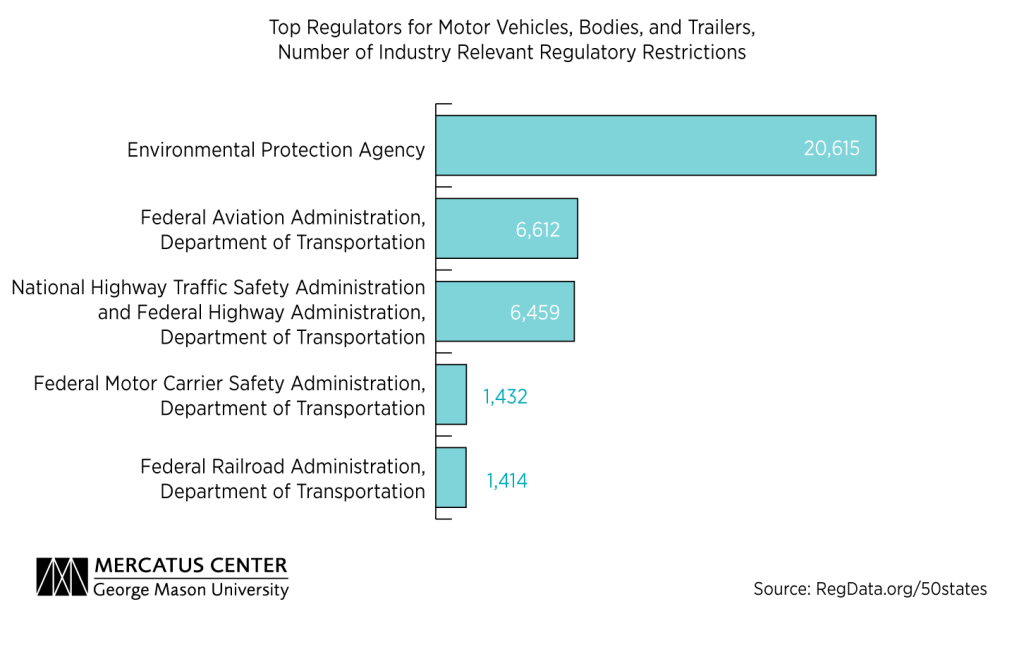
WASHINGTON, D.C. — The Mercatus Center at George Mason University has determined that Alabama is among the states whose economies are being most affected by federal regulations.
In a study, Mercatus ranks each state using its RegData database. Using that tool, the researchers can examine the relative impact of federal regulation on a particular state. RegData creates an industry regulation index by counting the words and phrases in the Code of Federal Regulations that indicate a specific mandated or prohibited activity and then by classifying those regulatory “restrictions” according to which industry or industries they likely target.
Because the federal code of regulations grows at an almost exponential rate, the findings of the study apply to the laws that were in effect as of 2013. For that year, the impact of federal regulation on Alabama industries was 15 percent higher than the impact on the nation overall.
The study notes that although the impact on a specific state may fluctuate from year to year, more dramatic growth has occurred in the total number of regulatory restrictions affecting Alabama since 1997.
What drives the state’s score is the particular industries that make up the state’s economy and the degree to which those industries are regulated. The top five industries in the state are real estate, retail trade, professional/scientific/technical services, wholesale trade, and motor vehicles manufacturing.
The industry that contributes the most to Alabama’s regulatory ranking is motor vehicles, bodies and trailers, and parts manufacturing. In recent years, the yellowhammer state has been successful in recruiting many automotive manufacturing plants from companies such as Hyundai, Honda, and Mercedes.
Although this industry accounts for only 5.9 percent of the private sector in Alabama, its dramatic increase from 28,133 restrictions in 1997 to 40,283 restrictions in 2013 was a major contributor to Alabama’s 70 percent growth in weighted restrictions over that time period.
Because the motor vehicles, bodies and trailers, and parts manufacturing industry constitutes only 2.0 percent of the private sector for the entire nation, compared to 5.9 percent for Alabama, the state represents one of the most notable cases of increased impact on a state for the period of this study.

The Environmental Protection Agency provides the most restrictions on that sector with just over half of the industry’s total. The next four largest regulators are all housed within the Department of Transportation and together add 15,917 to the industry-relevant restriction count.
EPA regulations have also harmed the state’s energy sector. Alabama Power has been forced to shut down numerous coal-fire power plants in light of restrictions from the Obama administration.
It is also possible that many of the regulations on the state are tied to the high amount of federal funds it receives. In the late 1980s, the Supreme Court found that Congress may attach “reasonable conditions” to funds disbursed to the states without running afoul of the Tenth Amendment. More often than not, these “reasonable conditions” are some for of regulation.
Last month, personal finance site WalletHub released an in-depth analysis of the Most and Least Federally Dependent States of 2016, and Alabama came in as the 3rd most dependent state in the country. Alabama also ranked 4th in most federal contracts received and 3rd in highest other financial assistance (per dollars in federal taxes paid).
RELATED: Alabama ranked among states most dependent on the federal government
Alabama ranked 5th in State Residents’ Dependency and 9th in State Government’s Dependency. Typically between 35 and 40 percent of Alabama’s budget is funded by the federal government.
The Mercatus study in its entirety can be seen here.
All data and statistics courtesy of the Mercatus Center












